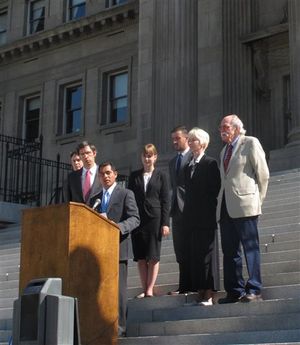Lawsuit charges Idaho’s public defense system violates state, U.S. constitutions
Despite five years of warnings, Idaho has continued to violate the U.S. and Idaho constitutions by failing to provide poor people charged with crimes with lawyers who can adequately defend them, a class-action lawsuit filed today charges. Instead, the state has responded by creating a series of “virtually powerless committees,” and enacting minimal law changes in 2014 that, the lawsuit says, not only didn’t go far enough to fix the problems, but aren’t even being followed.
Among them: The 2014 legislation banned “fixed-fee” contracts with public defenders, in which they’re paid a set amount regardless of how many clients they represent or how complicated the cases are. That provides them an incentive to spend as little time as possible on each case, particularly if they also have paying clients, the lawsuit says. Yet, 19 Idaho counties still use fixed-fee contracts. You can read the full complaint here.
Idaho established a public defense subcommittee of its Criminal Justice Commission in 2010 to examine the problem after an audit pointed to serious deficiencies. It set up a special legislative committee in 2013. That panel then established “yet another commission to make recommendations to the legislature,” the lawsuit says. “Astoundingly, the state failed yet again in the recently concluded 2015 legislative session to fund or improve its public-defense system. Because the executive and legislative branches refuse to take the necessary actions to fix Idaho’s public-defense system, it falls on this Court.”
The 2014 legislation set up a state Public Defense Commission, which among other things, was to propose rules and standards for public defenders statewide by January of 2015; it hasn’t done so, according to the lawsuit.
“State officials themselves have recognized the current constitutional crisis regarding indigent services in Idaho,” says the lawsuit, filed in state court by the American Civil Liberties Union of Idaho, the national ACLU’s Criminal Law Reform Project and Hogan Lovells, an international law firm. “In August 2013, the Chief Justice of the Idaho Supreme Court noted that ‘our system for the defense of indigents, as required by Idaho’s constitution and laws, is broken.’ And Gov. Otter acknowledged in his 2015 State of the State address that, despite the 2014 amendments to Idaho’s public defense statutes, ‘our current method of providing legal counsel for indigent criminal defendants does not pass constitutional muster.’”
The 2014 legislation also directed Idaho’s 44 counties to either establish an office of public defender, partner with other counties to do so, or establish contracts that don’t rely on fixed fees. Seven now have such offices, while two have partnered in a joint office. Thirty-four still contract the services out, with 19 of those under fixed-fee contracts, the lawsuit says. And one county has no arrangement, just appointing lawyers on an ad-hoc basis.
Repeated surveys and studies have found that caseloads are so high for Idaho public defenders that many poor defendants can’t reach their attorneys, the lawsuit charges, no matter how hard they try, and barely get to speak to them before they appear in court; among the named plaintiffs, one called his public defender more than 50 times from jail without reaching him. Plus, the lawsuit says only five of the 44 counties provide public defenders at defendants’ initial appearances, when pleas are taken and bail set – even though Idaho law specifically requires legal representation at initial appearances. As a result, several of the named plaintiffs spent months in jail after bail was set that was too high for them to afford, and they had no idea how to contest it.
The lawsuit, filed in 4th District Court in Ada County, was filed against Gov. Butch Otter and the seven members of the Idaho State Public Defense Commission, including two state lawmakers, a judge, and the state appellate public defender. Otter’s office had no comment; neither did Attorney General Lawrence Wasden's office.

